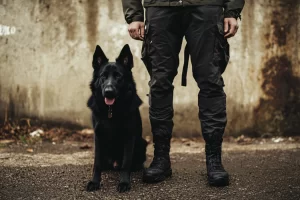A Comprehensive Approach to Socializing your German Shepherd Puppies
Socialization remains one of the most misunderstood aspects of training German Shepherd puppies. Traditionally, socialization entailed exposing puppies to various people, locations, and other dogs to make them adaptable. Many new puppy owners are surprised when we suggest this traditional perspective will often lead to behavioral problems. If this is so, many inquire, “How do we socialize our new German Shepherd puppies if we are not letting them play with other dogs?”
Additionally, some believe that exposing a shy puppy to strangers who offer treats will make the dog view strangers positively. While these methods were once widely recommended, experience and evolving understanding reveal they are not the most effective strategies. These are great question. Let’s get into why we exercise caution in how we introduce our German Shepherd puppies to other dogs and better ways to socialize our young dogs.
First, Lets Re-define What It Means to Social Our German Shepherd Puppies
Our approach to socialization focuses on helping dogs become comfortable with new places and circumstances. The goal is for our dogs to be indifferent to people, places, and stimuli. We want our dogs to perceive strangers as part of the environment, not as potential interactors. Consequently, when introducing our dogs to unfamiliar environments, we aim for them to look to us for leadership and direction.
Implementing Effective Socialization Strategies
The socialization process starts immediately upon acquiring a dog. This initial phase involves demonstrating that we control every aspect of the dog’s life, using tools such as leashes and crates while ensuring interactions are enjoyable through the use of food rewards.
Generally, puppies have a higher drive for food than toys. However, with most working breeds, this changes over time if properly triggered during early development stages. Utilizing verbal markers, we initiate training by “charging the mark,” establishing the value of food rewards in a matter of days. Following this, we proceed to work on “engagement.”
Engagement Training for German Shepherd Puppies
Engagement stems from the concept that a dog, when focused on its handler, will ignore distractions in the environment. This focus is a learned behavior rather than an innate trait, likely a necessity for about 1 in 10,000 dogs without training. The majority require structured training to achieve and maintain engagement.
We begin engagement training with high-value food treats, such as small pieces of meat or all-natural treats. These are distinct from standard commercial dog biscuits. When the dog focuses on us, we mark and reward this behavior with a treat. Training during times when the dog is hungry further reinforces engagement, making the handler a fun and rewarding presence.
Progression and Increasing Distractions
Engagement training starts at home in a distraction-free environment and progresses to new locations with gradually increasing distractions. This gradual exposure builds an association for the dog, teaching it that exciting things occur in new places. As the dog’s engagement grows, we introduce new environments that might initially stress the dog, using these situations to reinforce and solidify engagement training.
Addressing Interactions with Strangers
Allowing strangers to interact with your dog often leads to issues because most people cannot effectively read canine body language or recognize signs of stress or fear. Incorrect interactions can induce a fight-or-flight response, creating long-term problems. Therefore, it is crucial to educate others about proper behavior around your dog: ignore the puppy, do not invade its space, and avoid direct interaction.
Handling Intrusive Strangers
New dog owners must be prepared to assertively manage interactions with strangers. If someone disregards your instructions and approaches your puppy, it is essential to be firm and protect your dog. Prioritizing your dog’s comfort and safety over potentially hurting someone’s feelings is crucial. If a dog becomes fearful of strangers due to repeated negative experiences, it may learn to ward off people with aggressive behavior, inadvertently trained by the handler’s failure to offer protection.
Positive Reinforcement in New Situations
When strangers approach or the puppy encounters new, stressful environments, use high-value treats to redirect its focus and reinforce positive behavior. This method teaches the dog to view new people and places as cues for engaging with you and receiving rewards.
Controlled Interaction with Other Dogs
Allowing interactions with unfamiliar dogs is risky. One negative experience can cause lifelong dog aggression. Therefore, it’s best to avoid strange dogs entirely. Instead, seek out controlled introductions with well-mannered dogs known to be non-aggressive. Use these situations for engagement training in the presence of other dogs under your supervision.
Enclosed Pens and Leads While Socializing German Shepherd Puppies
Proper socialization begins at home. Raise puppies in an environment that allows them to observe and learn without full freedom, like an ex-pen or dog crate. This setup allows for correction of undesirable behavior, teaching the puppy house manners and acceptable interaction calmly.
Tethering Method Indoors
Keep puppies tethered to you within the home using a buddy leash system. This prevents unwanted behaviors such as garbage raiding or inappropriate elimination. This method also facilitates immediate correction and positive reinforcement, teaching the puppy to remain close and responsive. You will appreciate a measured, controlled behavior once your working line GSD is grown.
Defending Against Uncontrolled Dogs During Walks
As a pack leader, it is your responsibility to protect your dog from uncontrolled dogs during walks. Carry a walking stick or bear spray to deter any approaching dogs. If a potential threat arises, step between your dog and the other animal, using the stick or spray if necessary. This assertive action not only ensures safety but strengthens your dog’s trust in your protection.
Advanced Socialization Strategies
A sophisticated understanding of socialization involves structured exposure to varied stimuli while maintaining the dog’s focus and engagement. It requires diligent observation, timely intervention, and a strategic approach to interactions with both people and dogs, ensuring positive experiences.
Conclusion
Advanced dog training of German Shepherd puppies must include re-evaluating traditional socialization methods in favor of strategies that prioritize the dog’s comfort and engagement. By training dogs to focus on their handlers and remain indifferent to external distractions, we create confident, well-adjusted canines. For further insights and detailed methodologies, advanced trainers are encouraged to explore our expansive resources on dog training here at Czech Working Lines. Check back often as new articles are regularly posted.




